“Louie Louie, me gotta go.” These iconic words, the opening chorus of a song that has resonated through generations, mark the beginning of a rock and roll legend. While the first verse starts with “A fine little girl, she waits for me,” it’s the infectious chant of “Louie Louie” that immediately grabs listeners and propels them into the song’s captivating narrative.
The title itself, presented without a comma as “Louie Louie,” hints at a direct address. One might initially assume Louie Louie is a fellow sailor, but the line “I sail the ship all alone” quickly dispels that notion, revealing a solitary journey. Instead, the singer’s plea is directed elsewhere, fueled by a longing to return home from the vast Caribbean Sea and reunite with his beloved, promising, “I’ll never leave again.”
First emerging in 1957 as the B-side to You Are My Sunshine, “Louie Louie” initially failed to chart nationally in pop or R&B. However, it found fertile ground among young bands, particularly in the Pacific Northwest, becoming a regional anthem before its true breakthrough.
In 1961, Rockin’ Robin Roberts and the Wailers ignited the song’s regional popularity with a raw, garage-infused rendition that swept from Oregon to British Columbia. Soon, every band in the area embraced “Louie Louie,” adding it to their setlists. By 1963, both Paul Revere & the Raiders and the Kingsmen were vying to release their versions, setting the stage for rock and roll history.
It was the Kingsmen’s interpretation, heavily inspired by Roberts’ version, that catapulted “Louie Louie” into a realm of musical transcendence. Critics and historians have since struggled to find words adequate enough to capture the visceral impact of hearing and feeling this raw, energetic recording.
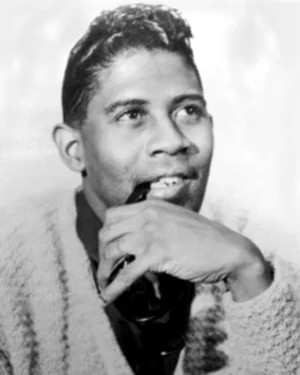 RichardBerry photo 1950s 800 crop copy
RichardBerry photo 1950s 800 crop copy
Richard Berry, the original singer and songwriter of “Louie Louie,” in a publicity photo from the late 1950s.
The Mystery of the Mumbled Lyrics
The Kingsmen’s recording of “Louie Louie” was characterized by a distinct lack of polish, unintentionally contributing to its legendary status. Lead singer Jack Ely’s vocals were recorded with a single microphone suspended high above him, amidst the loud instruments of his bandmates. The result was a muddied, almost unintelligible vocal delivery, sparking a nationwide guessing game about the song’s true lyrics.
This sonic ambiguity fueled the widespread belief among teenagers that “Louie Louie” contained hidden, obscene lyrics. Decades later, The New Yorker magazine delved into this phenomenon with an article aptly titled “Is This The Dirtiest Song Of The Sixties?“.
The recording conditions, Ely’s dental braces, and the band’s energetic performance combined to create a vocal track that defied clear comprehension. Ironically, this inaudibility made Ely the most celebrated interpreter of a song that became a near-universal rock and roll anthem, a sort of “pop Esperanto” as some described it.
“Louie Louie” endures as a quintessential rock & roll recording, and remarkably, one of the most covered songs in the history of popular music.
The song’s simple chord progression – A, D, E minor – made it incredibly accessible to aspiring musicians. As for the lyrics, the beauty lies in their flexibility. While “Louie Louie / Oh no / Me gotta go” serves as a recognizable starting point, the song practically invites improvisation. Sing your grocery list, pull random words from a hat – the spirit of “Louie Louie” embraces lyrical freedom.
The widespread suspicion of illicit content in the Kingsmen’s “Louie Louie,” a song frequently played on the radio for young audiences, even triggered an FBI investigation in 1963-1965. However, after extensive analysis, the agency’s experts were unable to decipher Ely’s exact lyrics, ultimately leading them to drop the case. The mystery of the “dirty” lyrics remained unsolved, adding another layer to the song’s mystique.
While the complete history of “Louie Louie” is rich and multifaceted, the core purpose here is to present the original lyrics penned and performed by Richard Berry in 1956, alongside the famously misconstrued lyrics of the Kingsmen’s 1963 rendition.
Before delving into the lyrics, take a moment to open YouTube in another tab and listen to both versions of “Louie Louie.” Experiencing the sonic differences and vocal interpretations firsthand will greatly enhance your appreciation of the lyrical nuances.
 RichardBerry LouieLouie Flip 78 800
RichardBerry LouieLouie Flip 78 800
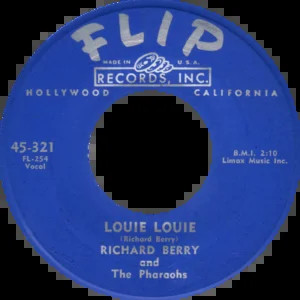 RichardBerry LouieLouie Flip 800
RichardBerry LouieLouie Flip 800
The original “Louie Louie” single by Richard Berry & The Pharaohs, released on Flip Records as both a 78 rpm and 45 rpm record.
Richard Berry’s Original “Louie Louie” Lyrics
Here are the authentic lyrics to “Louie Louie” as Richard Berry originally recorded them in 1956 with The Pharaohs. The Pharaohs, for this recording, were a vocal group among several Berry collaborated with, consisting of Godoy Colbert, Noël Collins, and Stanley Henderson.
Berry’s intention was to create a song that nodded to the calypso music craze popularized in the US by Harry Belafonte. However, the song opens with a distinctive, repetitive, doo-wop bass line (“Duh duh duh—duh duh—duh duh duh”) that permeates the entire track, grounding it in a different rhythmic tradition.
Below are Richard Berry’s original “Louie Louie” lyrics:
Louie Louie, me gotta go. Louie Louie, me gotta go.
Fine little girl, she wait for me. Me catch the ship across the sea. I sail the ship all alone. I never think I’ll make it home.
Louie Louie, I said me gotta go. Louie Louie, me gotta go.
Three nights and days, me sailed the sea. Me think of girl constantly. On the ship, I dream she there. I smell the rose in her hair.
Louie Louie, me gotta go. Well, Louie Louie, me gotta go.
Me see Jamaica Moon above. It won’t be long, me see me love. Me take her in my arms and then, I tell her I’ll never leave again.
Louie Louie, me gotta go. Louie Louie, me gotta go. I said me gotta go. I said me gotta go. Well, me gotta go.
The lyrics reveal a simple narrative of a sailor longing to return to his love. Notably, Berry employs “me” nineteen times and “my” only once, contributing to the song’s unique linguistic flavor.
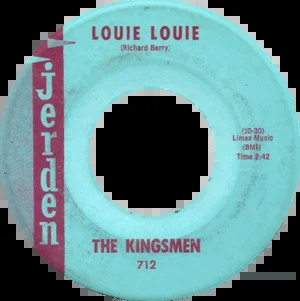 Kingsmen LouieLouie Jerden 800
Kingsmen LouieLouie Jerden 800
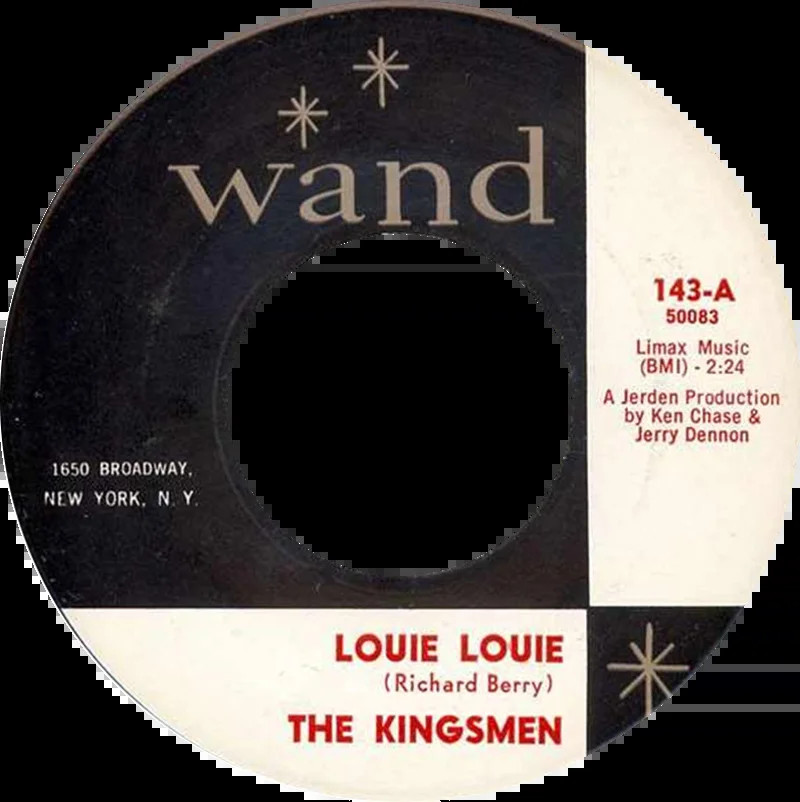 Kingsmen LouieLouie Wand 800
Kingsmen LouieLouie Wand 800
The Kingsmen’s “Louie Louie” single, initially released on Jerden Records and subsequently picked up by Wand Records for national distribution.
The Kingsmen’s “Louie Louie” Lyrics and Garage Rock Transformation
While Jack Ely’s famously garbled vocal delivery steals much of the spotlight, the Kingsmen were a fully functioning band who played their own instruments and sang. The band members at the time of the recording included Lynn Easton (drums), Jack Ely (rhythm guitar), Don Gallucci (keyboards), Mike Mitchell (lead guitar), and Bob Nordby (bass guitar).
Here are the Kingsmen’s rendition of the “Louie Louie” lyrics:
Louie Louie (oh, no), said me gotta go (yeah, yeah, yeah, yeah, yeah). I said, Louie Louie (oh, baby), I said baby, we gotta go.
A fine little girl, she waits for me. Me catch the ship across the sea. Me sailed that ship all alone. Me never think how I’ll make it home
Louie Louie (yeah, yeah, yeah, yeah) I said we gotta go (oh, no). Said Louie Louie (oh, baby), said we gotta go.
*
Three nights and days I sailed the sea. Me think of girl (oh) constantly. On that ship, I dream she there. I smell the rose in her hair.
Louie Louie (oh, no) said we gotta go (yeah, yeah, yeah, yeah, yeah, yeah). Louie Louie (oh, baby) said we gotta go.
(Okay, let’s give it to them right now!)
**
Me see Jamaica, the moon above. It won’t be long me see me love. Me take her in my arms and then, I tell her I’ll never leave again.
Louie Louie (oh, no), said we gotta go (yeah, yeah, yeah, yeah, yeah). Said Louie Louie (oh, baby), said we gotta go. I said we gotta go now. Let’s hustle on out of here. Let’s go!
Close examination reveals that the Kingsmen’s lyrics, as sung by Jack Ely on their “Louie Louie” version, remain remarkably faithful to Richard Berry’s original composition. The primary lyrical differences are Ely’s pronunciation of the title as “Loowee Loowie” and his ad-libs of oh-no’s, oh-baby’s, and numerous yeah’s, which are noted in parentheses above.
Musically, however, the Kingsmen’s version departs significantly from Berry’s calypso-infused original. They replaced the bass singer’s part with a prominent organ and substituted the instrumental bridge with a raw, energetic guitar solo. Beyond these changes, the core song structure remained.
The Kingsmen’s rendition abandoned any pretense of calypso, instead embracing a raw, unrefined energy. Ely’s vocal performance sounds almost frantic, while the band’s playing exudes an energetic sloppiness, a “rehearse? Nah—we got this!” attitude. This raw, unpolished sound has led many rock historians to classify the Kingsmen’s “Louie Louie” as proto-garage, if not the very first commercially successful garage rock anthem.
* An interesting anecdote: a four-letter word did make it into the final recording. Right after the second chorus, drummer Lynn Easton dropped his drumstick, audibly yelling, “Fuck!”
** Another notable moment occurs after the instrumental bridge and guitar solo, where Ely mistakenly comes in early with “Me see” and then has to pause, waiting for the band to conclude the bridge. These imperfections only added to the song’s raw charm and legendary status.
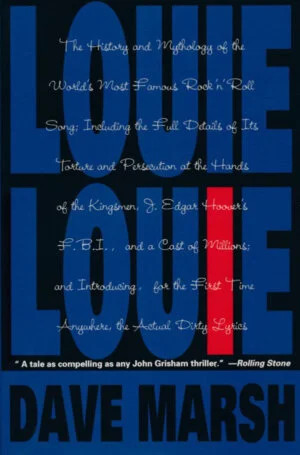 DaveMarsh LouieLouie later edition 600
DaveMarsh LouieLouie later edition 600
Dave Marsh’s comprehensive book, “Louie Louie: The History And Mythology Of The World’s Most Famous Rock ‘n’ Roll Song,” explores the song’s enduring legacy.
The Infamous Second Verse Misinterpretations
Reader Jim Miller’s comment brought to light a common mishearing of the second verse, with many listeners believing the lyrics to be “Every night at ten, I laid her again. I fucked that girl all kinds of ways.”
Adding to this, The New Yorker article mentioned that others misheard the same lines as, “At night at ten, I lay her again. Fuck you girl, oh, all the way.”
These misinterpretations, though humorous in retrospect, fueled the controversy and contributed to the song’s rebellious image.
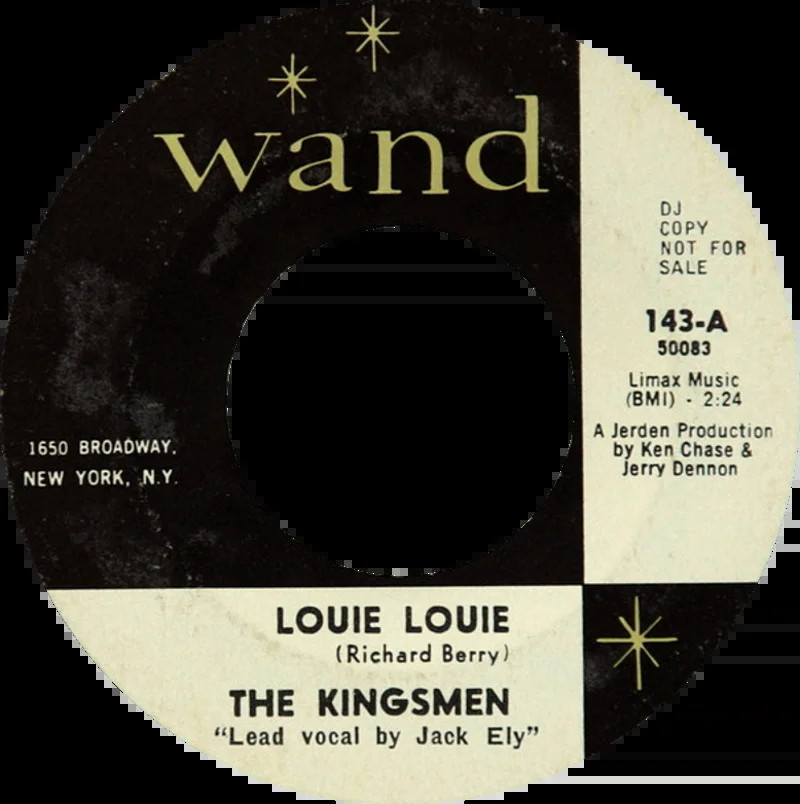 Kingsmen LouieLouie Wand Ely dj 800
Kingsmen LouieLouie Wand Ely dj 800
Later pressings of the Kingsmen’s “Louie Louie” on Wand Records, following a legal settlement with Jack Ely, credited “Lead vocal by Jack Ely” below the title.
“Louie Louie” on the Charts: A Sleeper Hit Phenomenon
While Richard Berry’s original version reportedly garnered some airplay and sales, it failed to penetrate the national charts. In contrast, despite the lyrical controversy surrounding the Kingsmen’s rendition, “Louie Louie” became a massive hit. It reached #1 on the Cash Box chart for two weeks in January 1964.
Notably, “Louie Louie” was the last chart-topping single by an American artist before the British Invasion, with The Beatles dominating the #1 position for the subsequent sixteen weeks. On the Billboard chart, “Louie Louie” peaked at #2 and #3 for six weeks between December 1963 and January 1964, narrowly missing the top spot.
The song faced censorship attempts, with some radio stations choosing to ban it from their airwaves. In Indiana, Governor Matthew Welsh, convinced of the lyrics’ obscenity, reportedly banned the song statewide, although the legal basis for such a ban remains unclear. These bans likely hindered the song’s ascent to the top of the charts.
Intriguingly, in May 1966, “Louie Louie” experienced a resurgence, re-entering the Cash Box Top 100 for five weeks and peaking at #65, demonstrating its enduring appeal.
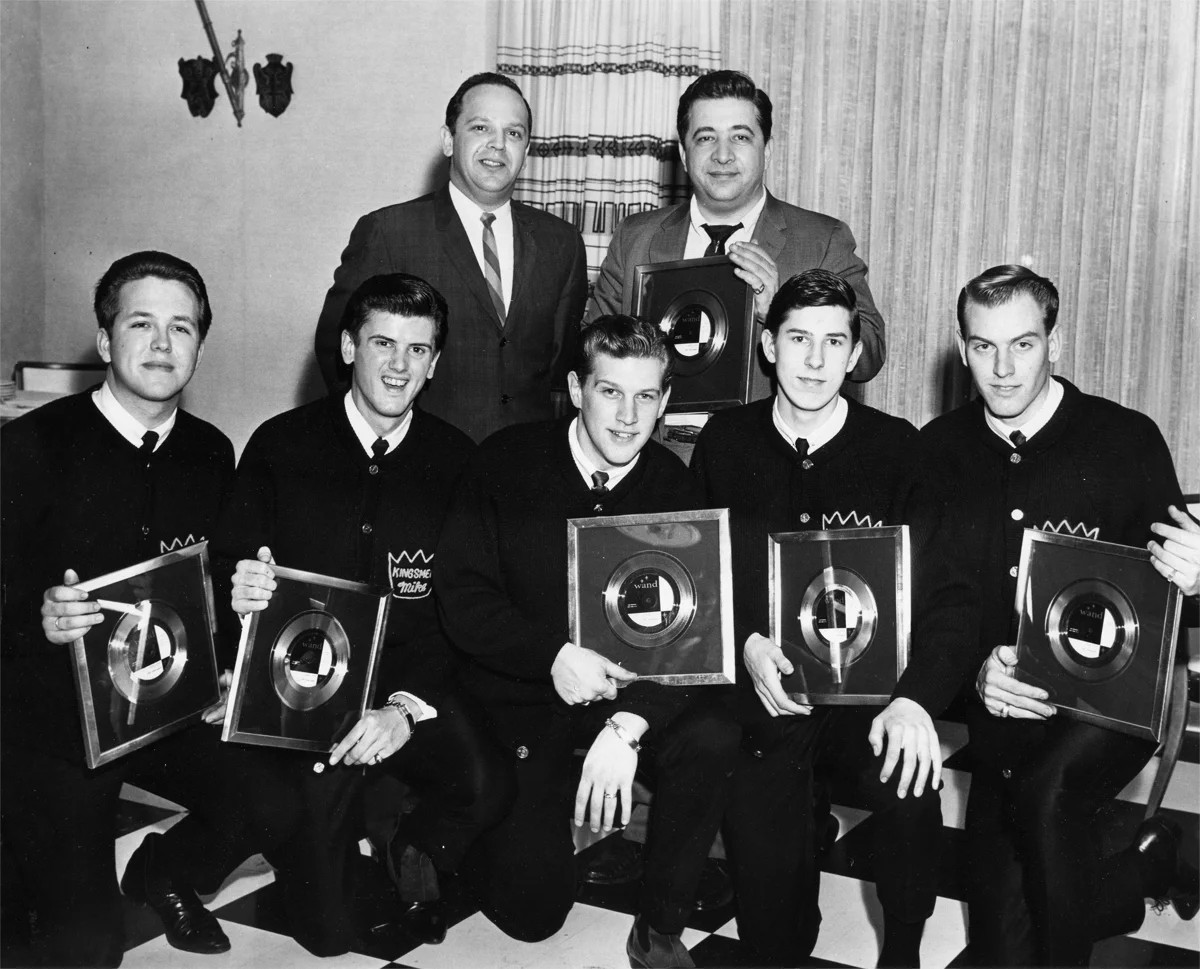 Kingsmen LouieLouie GoldRecord 1200
Kingsmen LouieLouie GoldRecord 1200
The Kingsmen receiving an in-house gold record award from Wand Records for “Louie Louie,” although by this time, several original members had left the group.
Sales Figures and the Enduring Legacy of “Louie Louie”
Estimates for the Kingsmen’s “Louie Louie” single sales vary. Wikipedia cites figures ranging from 10 to over 12 million copies, with cover versions potentially accounting for an additional 300 million. The 10-12 million figure is attributed to liner notes by Peter Blecha for the Rhino Records compilation The Best Of Louie Louie (1983).
However, Joseph Murrells’ Million Selling Records From The 1900s To The 1980s simply lists it as a million-seller. Furthermore, major lists of best-selling singles worldwide often omit the Kingsmen’s “Louie Louie,” and the song has never been officially certified Gold by the RIAA.
The claim of 300 million sales for cover versions, sourced from a 1986 Los Angeles Daily News article by Lewis Beale, appears highly exaggerated. For a thousand cover versions to reach such a massive figure, each would need to average 300,000 sales, implying consistent Top 100 hits for decades, which did not occur.
Regardless of the precise sales figures, “Louie Louie” undeniably remains a quintessential rock & roll recording, and one of the most frequently covered songs in popular music history. Its simple structure, infectious rhythm, and lyrical ambiguity have made it a timeless anthem for generations.
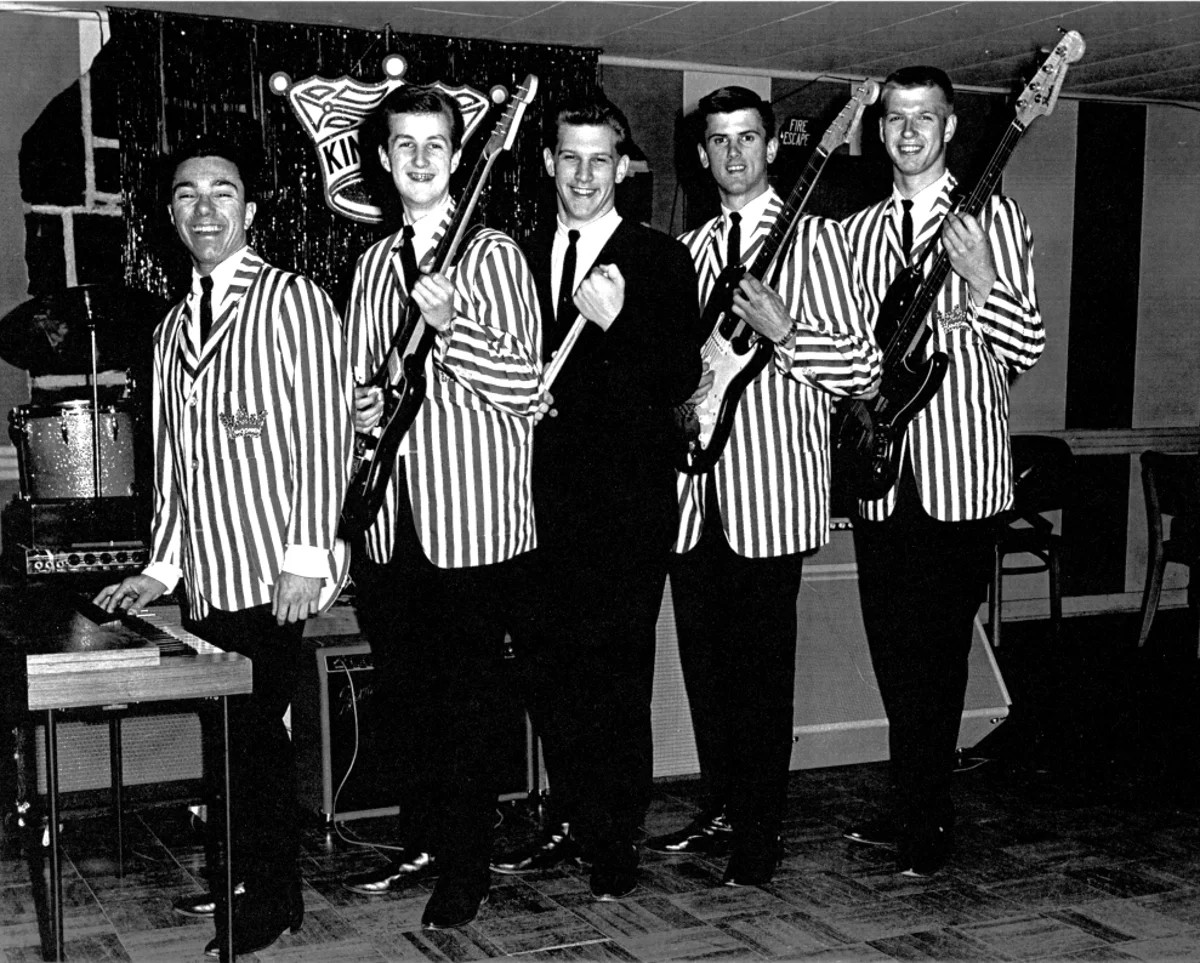 TheKingsmen 1963 1200
TheKingsmen 1963 1200
The Kingsmen in 1963: (left to right) Don Gallucci, Jack Ely, Lynn Easton, Mike Mitchell, and Bob Nordby. Photos of the band with Ely are relatively rare.
For those seeking to delve deeper into the world of “Louie Louie,” numerous online resources are available, including The Louie Report (https://www.louielouie.net/blog/?p=9612), a blog dedicated to all things “Louie Louie,” and Dave Marsh’s book, Louie Louie: The History and Mythology of the World’s Most Famous Rock ‘N’ Roll Song.
By Neal Umphred


